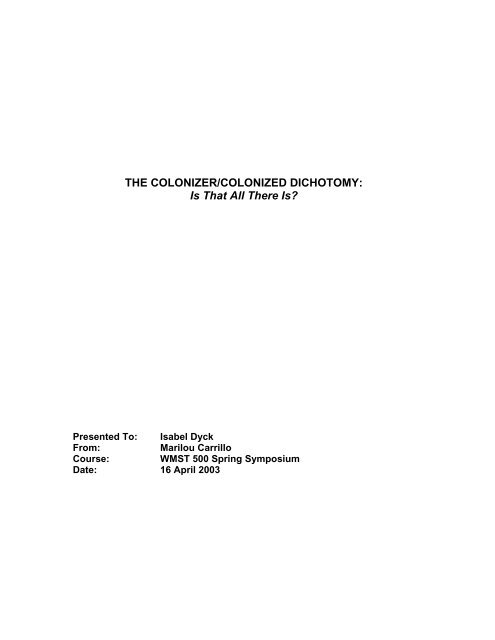The Colonizer/Colonized Dichotomy - Contact Us
The Colonizer/Colonized Dichotomy - Contact Us
The Colonizer/Colonized Dichotomy - Contact Us
- No tags were found...
You also want an ePaper? Increase the reach of your titles
YUMPU automatically turns print PDFs into web optimized ePapers that Google loves.
THE COLONIZER/COLONIZED DICHOTOMY:Is That All <strong>The</strong>re Is?Presented To: Isabel DyckFrom:Marilou CarrilloCourse:WMST 500 Spring SymposiumDate: 16 April 2003
of colour from the West/North, contribute to this remembering. More urgently, theexclusion of these assertions of remembering limits transformative views of the future –that “women” assumes all women of the world who yearn, struggle for, and know how tolive a just and equal collective life.A <strong>The</strong>oretical Schema<strong>The</strong> colonizer/colonized is an example of the power of dichotomy as epistemologicalframe. It is rarely questioned and elaborately justified in colonizing environments.Patricia Hill Collins’ intersectional analysis work traces bell hooks’ idea that “feminismdoes not engage us in the either/or dualistic thinking that is the central ideologicalcomponent of all systems of domination in Western society.” Hill Collins describes thecharacteristics of this social construction of oppositional difference as: (a) thecategorization of people and ideas based on their difference from one another, (b) noncomplimentarydifference that do not enhance each other, and (c) intrinsically unstable.<strong>The</strong>y are unstable because the relationship, by not representing difference and equality, isresolved by subordinating one of the pair to the other. “Dichotomous oppositionaldifferences invariably imply relationships of superiority and inferiority, hierarchicalrelationships that mesh with political economies of domination and subordination.” Inthis dualistic thinking she notes the implications of culture versus nature as therelationship that justified slavery and colonialism. Non-European peoples are seen ascloser to “nature,” more backward in their cultures, and therefore inferior. In oppositionto this, Europeans control nature, understand with reason (versus emotion), have a higherculture, are more civilized, and therefore superior. At present, we inherit thisdichotomous social construction and with globalization, the colonizer/colonized hasbecome the globalizer/globalized. <strong>The</strong> hierarchical, dual relationship remains intact.To step out of this trap, feminist thinking swung to post-modernist, post-structuralistfeminism. Michelle Barrett summarized this “paradigm shift” that questioned theemphasis on social structures (including capitalism), analyzed culture’s symbolizationand representation, and instead, emphasized subjectivity, plurality, agency, language, anddifference. While objecting to dualisms (rationalism versus Cartesian subject) shepoints to the “tension between the highly particularistic and relativistic view of
in rejecting the “colonizer,” are immersed in major paradoxes and contradictions – toreject the colonizer is to reject aspects of oneself. In order to not settle for this,McClintock offers the idea that dimensions of abjection --objects, states, zones, agents,groups, psychic processes, political processes – are interdependent but distinct,interrelated if not contradictory, not universal, and form part of “an immensely intricateprocess of social and psychic formation.” For those colonized, it is a challenge and anecessity to acknowledge that colonization is in, and constitute part of, our psychicbodies, at the same time that it is situated in the materialist reality of our physical bodies.Taking this materialist reality into account is as equally critical as acknowledgingabjection and the psychic process. <strong>Colonized</strong> bodies draw from this colonized, abjectmemory to understand the self and communities in colonization, but must also claim thehistorical, materialist memory of de-colonization struggles, resistance, and victories.More importantly, we sustain the spaces of non-colonization for a social, psychic,historical future of a non-colonized, liberated selfhood and nationhood.Both Freudian psychoanalysis and Marxist economics (and recalling Barrett’s critique oftheir universalist claims) repudiate the particular elements that interfere with theirtheories but which pertain to and structure the other. For example, psychoanalysis rejectsclass, race, cultural difference, etc., elements essential to Marxism, while Marxismrejects the unconscious, sexual desire, identity, etc. that are critical to psychoanalytictheory. Not falling into their binary opposition here, McClintock’s notion of a situatedpsychoanalysis informs history, recognizing that it emerged in historical relation toimperialism. She calls for both a decolonizing of psychoanalysis and a psychoanalyzingof colonialism. She ventures to conclude that “there should be no material historywithout psychoanalysis and no psychoanalysis without a material history.”Post-modernism’s emphasis on particularities and subjectivities in women’s experiences,narratives, historical and social contexts, and identities, is of intense value. Yet, in thisdiscussion of colonization and globalization, the colonizer and colonized, the indigenousversus industrial ethics and belief systems, substantive, universalist meta-narratives andstructures emerge. <strong>The</strong> tension needs critical examination as it has serious implicationsfor Majority World women’s and national liberation movements. <strong>The</strong> danger to anti-
colonialist discourse is not to unconsciously fall into the adaptation of deep-seatedruler/ruled, victimizer/victim, colonizer/colonized binaries. However, post-modernist“dispersal and particularity” may not only limit the understanding of colonial historicalpatterns and synthesis, but may fragment and segment the essential understanding of selfand community as well as unified action against colonizing injustices.Veronika Bennholdt-Thomsen and Maria Mies critique post-modernism in light ofglobalization. <strong>The</strong>y assert that avoiding essentialism and universalist narratives fragmentand deny the historical and materialist realities of women’s experiences. When onlydifferences are seen in societies, individual differences, if not antagonisms, are furtherreinforced. Such fragmentation may actually prevent solidarity movements, and depoliticizepeople for not engaging powerful global systems that dominate societies inuniform ways. One of the most negative results that can come out of postmodernism isthat, on the basis of its own social construction, struggles for women’s liberation – or forthe liberation of any other oppressed group or class – become virtually impossible. <strong>The</strong>reis no commonality, no common cause, no common ethics, no common vision. In order tobe politically active, however, a somewhat larger perspective than one’s own experienceis necessary.Imperialism and ColonizationAnd it is our experience that industrial society is notcontent to leave other people’s riches alone. Wealthattracts colonialism: the more a native people has,the more colonizers are apt to covet that wealth andtake it away – whether it is gold or, as in our case,pine stands and Red River farmland….For us, ourwealth was the source of our poverty: industrialsociety could not leave us be.Winona LaDukeWhite Earth Reservation, Anishinabeg BandMississippi<strong>The</strong> context of globalization, and its impact on women worldwide, rest in the histories ofcolonization among the majority of the world’s countries and populations (thus, the termMajority World is used here to include not only geographic nations but also indigenous
peoples within them). <strong>The</strong> link between globalization and colonization is obvious andunchanged for those who have lived hundreds of years of colonization. Perhaps for FirstWorld feminists, globalization is a new phenomenon. For Majority World peoples, thereare shared narratives of how generations were colonized for the first time, in globaldimensions, by seafaring Europeans from the late 15 th and early 16 th centuries. <strong>The</strong>irpeople were sold into transcontinental slavery or enslaved in their own lands, exploitedand made indentured servants transnationally up to the present. <strong>The</strong> narratives ofcolonialism in particular countries abound. What is interesting about these are the metanarrativesarising from these experiences. Whether colonized by Britain, Spain, Portugal,Italy, Holland, Belgium, or France in their imperialist enterprises of pre-industrializederas, colonial history’s blueprint is recognized in just about every country suffering thehardships of globalization today. This is not a mere coincidence. <strong>The</strong> systems of socialand economic control changed hands throughout these 500 years, but the relations amongthe ruling elite and various sectors of these societies remain structurally, and thereforeessentially, unchanged.Indigenous nations and aboriginal communities shouldered the onslaught of thisEuropean enterprise and worldview. <strong>The</strong>y are witness to the avarice and resolve ofimperialist powers and their expression of colonizing other peoples and nations withimpunity. Linda Tuhiwai Smith, a Maori, relates imperialism and colonialism. Shenotes that European imperialism is understood and treated in four ways: economicexpansion, subjugation of others, the spirit that characterizes Europe’s global activities(that of a complex Enlightenment ideology of cultural, intellectual, and technicalexpressions), and a discursive field of knowledge. Colonialism is one expression ofimperialism that allows it to expand its world view by dominating colonies. As a systemof economic expansion and control, imperialism sought new wealth and possessions, andsecured markets and capital investments. Winona La Duke, a Chippewa Anishinabeg,describes U.S. imperialism’s colonization of the Chippewas in the U.S. and the Ojibwaysof Canada. Together they are the Anishinabeg people who lived in the Great Lakesregion. As a colonial blueprint, the story is familiar. <strong>The</strong> federal government passedlaws (General Allotment Act of 1887) and treaties that divided the reservation into 80-acre parcels of land for each individual Indian. <strong>The</strong> “surplus” was then given to white
people to homestead; in the case of the Anishinabeg, the pinelands were given to the stateof Minnesota and later sold to timber companies.Looking at imperialism from what Tuhiwai Smith calls the “spirit” or idea of imperialistrealization, the individualist approach, of ownership, land use, and fragmentation ofresources, was paramount to the “spirit” of this law. What aboriginal person whosecommunal knowledge of an interdependent ecosystem would survive on 80 acres ofindividual land over which man [sic] has dominion? Like La Duke, Patricia Monture-Angus, a Mohawk, looks at the imperialist-colonialist “spirit” through Canada’seducation and legal systems. She states strongly that the “entire system of property lawin this country is built on a great lie – that colonial myth” that Columbus discoveredAmerica and claimed it for the Europeans. She superimposes aboriginal values thatcontradict those of colonialism, and hence, her inability to accept the very premise ofpresent-day Canadian law, education, and other social systems.Looking at imperialism from a “discursive field of knowledge,” post-colonialist feministdiscourse has made valiant attempts at deconstructing these colonization themes.Chandra Talpade Mohanty’s seminal article, “Under Western Eyes,” examines the globalaspects of women’s oppression. She critiques on the one hand the universalist method ofdescribing women’s oppression without the necessary context-specific differentiatedanalysis. Similarly, she, on the other hand, points to the lack of the specification of localcultural, ideological, and historical contexts in concepts and explanations for women’soppression. She challenges Western feminism in relation to the universalist constructionof Third World women by the over-categorization and then generalization ofsuperordinate systems of representation of gender and culture. <strong>The</strong> result is the loss ofthe histories, agencies, and material, complex realities of women of the Third World.Yet, from the perspective of a Majority World experience, the context of colonization ofthe past is understood as continuing in the present in many populations and nations.While the particularities and contextual analyses are critical for our understanding of howglobalization operates in women’s lives today, the meta-narrative of colonialism andimperialism, the universality of the effects on colonized people, and the essentialism of
the knowledge of the structures of colonialism are the other side of the coin of Mohanty’spost-colonial feminist critique. <strong>The</strong>y are equally valid starting points in feministanalysis. Essentialist/non-essentialist, intersubjectivities, and multiplicities are noteither/or undertakings in feminist criticism. In re-visiting her 1986 article, Mohantywishes to affirm “the connections between local and universal.”Aboriginal writers and scholars assert their colonized experience, which had equallydevastating parallel effects as colonized women from the Third World. In thePhilippines, indigenous women from the Cordillera and Mindanao regions speak theindigenous worldview with common themes as the aboriginal people of Canada. <strong>The</strong>yare, however, also women from the Third World suffering the consequences of neocolonialism.<strong>The</strong>y claim that the Spanish conquest did not devastate their mountaincommunities nearly as severely as the Filipinos in the lowlands. <strong>The</strong>y are, however,being strangled by transnational mining companies in today’s inescapable neo-liberaleconomic war to exploit the labor and grab the land of indigenous people. In place ofwhat used to be colonial treaties made with indigenous peoples, there are nowinternational economic agreements between First World global financial entities andimpoverished, corrupted local Third World governments. <strong>The</strong> borders betweenindigenous and non-indigenous women in the Philippines, and in Canada for that matter,exploited by neo-liberal economic policies are erased. <strong>The</strong> borders between ThirdWorld and First World indigenous and non-indigenous women are also invisible to globaleconomic elites. Majority World peoples who struggle against old and new imperialismcomprise most of our world while global economic elites continue to rule as minorityelites have done since the 15 th century. If aboriginal versus non-aboriginal womensuffer under the same imperialist systems, the politics of difference or identity betweenthem cannot obscure their shared struggle against colonialism, and even more important,not impede the assertion of their belief systems and the ethics of being human itself.
BIBLIOGRAPHYBennholdt-Thomsion, Veronika and Maria Mies. (1999). <strong>The</strong> Subsistence Perspective:Beyond the Globalised Economy. London: Zed Books.Bobis, Merlinda. (1990). Ang Lipad ay Awit sa Apat na Hangin. [<strong>The</strong> Flight is the Songof the Four Winds] Manila: Institute of Women’s Studies.LaDuke, Winona. (1997). Voices from White Earth: Gaa-waabaabiganikaag. InHildegarde Hannum (ed.), People, Land and Community. London: Yale UniversityPress.McClintock, Anne. (1995). Imperial Leather: Race, Gender and Sexuality in theColonial Contest. NY: Routledge.Monture-Angus, Patricia. (1995). Thunder in My Soul: A Mohawk Woman Speaks.Halifax: Fernwood Publishing.Mohanty, Chandra Talpade. (1991). Under Western eyes: Feminist scholarship andcolonial discourses. In C. Mohanty, A. Russo, & L. Torres (eds.). Third World Womenand the Politics of Feminism. Bloomington: Indiana University Press.______________________. (2003). “Under Western eyes” revisited: Feminist solidaritythrough anticapitalist struggles. In Feminism Without Borders: Decolonizing <strong>The</strong>ory,Practicing Solidarity. Durham: Duke University Press.Razack, Sherene. (2000). Your place or mine? Transnational feminist collaboration. InA. Calliste & G. Dei (eds.). Anti-Racist Feminism. Halifax: Fernwood Publishing.Smith, Linda Tuhiwai. (1999). Decolonizing Methodologies: Research and IndigenousPeople. Dunedin: University of Otago Press.
















